
If you grew up in the 1960s, 1970s or even the 1980s, you were likely one of the many people who spent hours in pursuit of the perfect suntan. Before the medical community realized the negative long-term effects of tanning, it was common practice to lie out in the sun for hours with baby oil slathered on your skin. Today doctors know that using baby oil to tan is quite harmful to your skin.
History
Until the 20th century, tanned skin was the mark of the working class who labored outside, tanning their skin in the process. Only the wealthy had the means to lounge indoors all day and keep their skin fair. The tanning fad began in the 1920s and reached a peak in the 1960s when surfer culture exploded into the mainstream. Movies in beach settings and music from groups like the Beach Boys glamorized the tan surfer crowd and made American teenagers yearn to be tan too. Baby oil was touted as the quickest way to achieve a deeply bronzed body.
Function
The reason that baby oil works so quickly to tan your skin is that it is only a moisturizer. While many sunscreens do contain moisturizer, they also contain a number of active ingredients to block harmful UVA and UVB rays from the sun. Without these ingredients, which include salicylates and benzophenones, baby oil offers no protection against sun damage.
Misconceptions
You may think that it is safe to use baby oil to tan at certain times of the day, in overcast weather or if you are only outside for a short while. These popular misconceptions are all false. While your risk of a damaging sunburn is greatest between 10 a.m. and 3 p.m., there are no risk-free daylight hours. Clouds block the sun's light but not UVA or UVB rays. Even a short time outdoors with no sun protection is enough to damage your skin unless you apply a good sunscreen first.
Effects
A 2006 study published in the Archives of Dermatology found a 76.9 percent increase in the number of Medicare subscribers treated for non-malignant melanoma between the years of 1992 and 2006. Study author and dermatologist Dr. Howard Rogers calls this trend "a problem that is not going away," pointing out that the number of non-malignant melanoma cases rose an average of 4.2 percent each year. Researchers expect the numbers to continue to climb as the population who frequently tanned with baby oil in the 1960s through 1980s ages.
Prevention
The Skin Cancer Foundation recommends daily use of a sunscreen with an SPF rating of at least 15, regardless of your skin tone. If you are prone to sunburns or have a history of skin cancer, use a product with an SPF rating of 50 or more. Baby oil offers no protection against the sun and therefore has an SPF rating of zero. Never go out into the sun with baby oil on your skin to reduce the risk of sunburn and future melanoma occurrence.
Related Articles

Skin Rashes Caused From Tanning Beds

Baby Shampoo & Acne
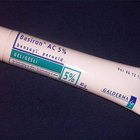
Acne Cures From the Past

Uva Vs. Uvb Tanning Beds
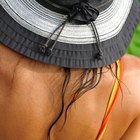
Difference Between Bronzing & Tanning ...
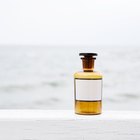
Uses, Advantages and Doses of Castor Oil
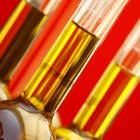
Jojoba Oil Benefits

How Many Times Should I Tan in a ...

The History of Coppertone

Tanning Oil Tips

How to Get a Good Tan on the Beach
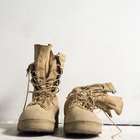
How to Treat Leather Boots With ...

The Quickest Way to Get a Tan Without ...

What Do You Use to Help You Tan in the ...
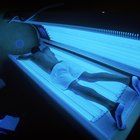
Can You Wear Contacts While Tanning?

Is it Better to Tan With or Without ...

How Many Times Do You Have to Indoor ...

How to Get a Base Tan in a Tanning Bed

How to Get Tanner Faster With Self ...

Do Swimmers Have More Acne Breakouts?
References
Writer Bio
Donna Johnson is a writer from Louisville, Ky. Her articles have appeared on several websites since 2009, including Edubook.com. Her areas of expertise include parenting, crafting, and home improvement. Prior to becoming a writer, Johnson had more than 10 years of experience in home improvement retail.
Photo Credits
sun bather image by Wimbledon from Fotolia.com